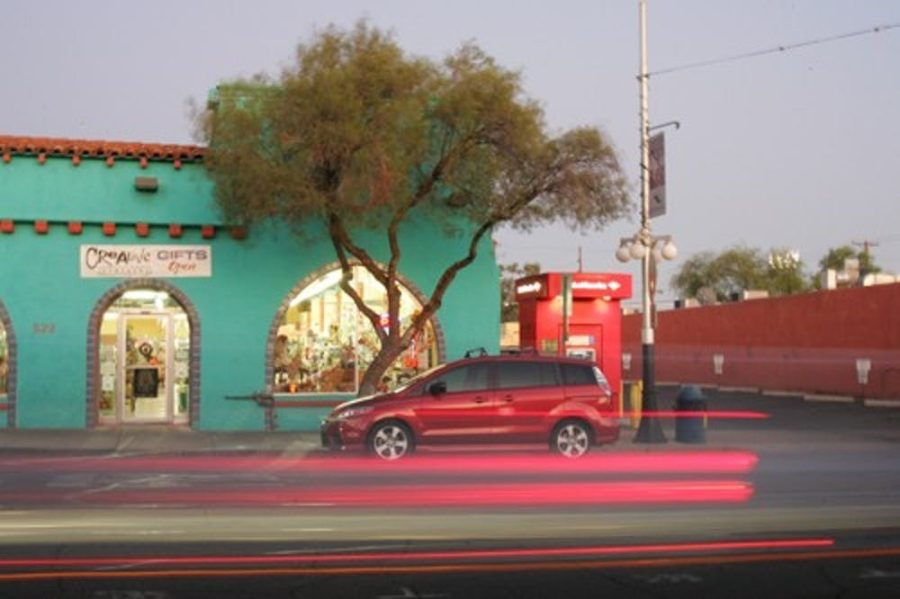Walking down Tucson’s historic Fourth Avenue, University of Arizona students can find eclectic storefronts, colorful murals and everything from bookstores to restaurants. At its core, they will discover a unique district at the intersection of past and present, now facing an uncertain future.
The history of Fourth Avenue truly began in 1916 when the construction of the Fourth Avenue Underpass allowed the area to develop into a central commercial district.
During the early and mid 20th century, the avenue became a supply chain for surrounding areas. This was the Fourth Avenue Tucson Thrift Shop owner Arlene Leaf discovered when her parents first moved to Tucson in the 1940s as owners of a women’s clothing store.
“So, as downtown merchants, Fourth Avenue was where all the backup businesses were to support the retail downtown,” Leaf said. “That was where you got your paper bags. That was where you got your sewing supplies. That was where the post office was.”
Leaf watched the area grow increasingly lively as a teenager in the 1950s, followed by a subsequent lull in the early 1960s. Businesses moved out from downtown and big shopping centers began to dominate the market.
“I think it was 1962,” Leaf said. “I was working in California. When I came back — I’ll just never forget it — I went to Fourth Avenue, and it was all abandoned. And it was so sad.”
According to Leaf, Fourth Avenue as we know it today began to take form in the late 1960s when lower rents attracted various unique small businesses. In 1979, she opened Tucson Thrift Shop with her father.
The shop was a costume and vintage store created with the intention of gathering donations for The City of Hope Hospital, the hospital that helped with her father’s cancer treatment. She has now been in business for 41 years.
“In ’79 the perception in the community was like ‘ooh’ because it’s always attracted alternative people — all kinds of people,” Leaf said. “It’s one of the few places in Tucson that gets such a cross-section of the community shopping and just being there. Now I see everybody loves it.”
The Fourth Avenue of today is characterized by a myriad of unique small businesses, half of which, according to Creative Director and COO of Fourth Ave Merchants Association Monique Vallery, are female-owned. Three years ago the avenue was designated as a historic business district.
“We don’t have any chains down here,” Vallery said. “People often reference ‘Well, you have a Dairy Queen, right?’ So that Dairy Queen has been in the same family for 65 years.”
Just one of the many small businesses on Fourth Avenue is Pop-Cycle. Founded in 2008, Pop-Cycle is a comparatively newer shop on the avenue supporting 95 local makers and selling upcycled and sustainable artwork and gifts. Libby Tobey, the store manager, explained that, to her, Fourth Avenue represents a vibrant community reflecting parts of the Tucson identity.
“We are like one of the unique districts being a historic district, but also something that shows a big flavor of Tucson in a small walkable space,” Tobey said.
RELATED: CARES Act to keep Tucson’s small businesses running
2020 marked a large disruption to the lives of small business-owners on Fourth Avenue. The COVID-19 pandemic forced retail and restaurant workers to adapt to quarantines and mask mandates.
The pandemic also triggered the cancellation of both the 2020 Winter and Spring Street Fairs, events that Vallery estimated typically bring about 300,000 visitors into the district. Businesses closed temporarily due to safety concerns and some shut their doors permanently.
“What we’ve seen from our businesses over the last … nine months is that some of them have really figured out how to be resilient,” Vallery said. “Some of them have totally had to change their business models and are doing it as successfully as they can. And unfortunately, you know we’ve had businesses that have had to permanently close.”
Vallery said about eight businesses have closed since the start of the pandemic, but a couple of new ones have opened.
Restaurants turned largely to takeout to stay afloat while retail stores sought to establish an online shopping presence. According to Tobey, adapting Pop-Cycle’s hand-crafted merchandise to an online format was a demanding and challenging process.
“In February [2020], Pop-Cycle had 10% of our merchandise on our website, now we have 98%,” Tobey said. “But it was a huge undertaking because it’s not something that we exactly knew how to do.”
Pop-Cycle is now open 12 p.m. to 5 p.m. Monday through Friday. Interested customers can also make private shopping appointments on the Pop-Cycle website.
On the other hand, Tucson Thrift Shop remains temporarily closed, taking the opportunity to do extensive inventory. This is not the first major adversity Leaf has faced with her store.
Leaf cited the COVID-19 pandemic as the fifth time she has had to rebuild, with three floods and one fire in the past. She related her response at the beginning of the pandemic to that of the fire that burned her original location.
“With [COVID-19], it was a little bit like with the fire,” Leaf said. “When we had the fire sale, I said, ‘Okay, I want to get the boxes and paint polka dots on them and make them pretty so that people’s last impression is not this heavy, sad impression.”
Vallery, Leaf and Tobey remain optimistic about the future of Fourth Avenue and eagerly await a return to normalcy as the pandemic comes to an end.
However, Vallery emphasized the need for the University of Arizona community to support local businesses during this difficult time.
“We understand that the students are vital to our success, but students can also play a role in our demise. And that’s part of, unfortunately, what we’re in right now,” Vallery said.
Follow Hillary Schiff on Twitter









